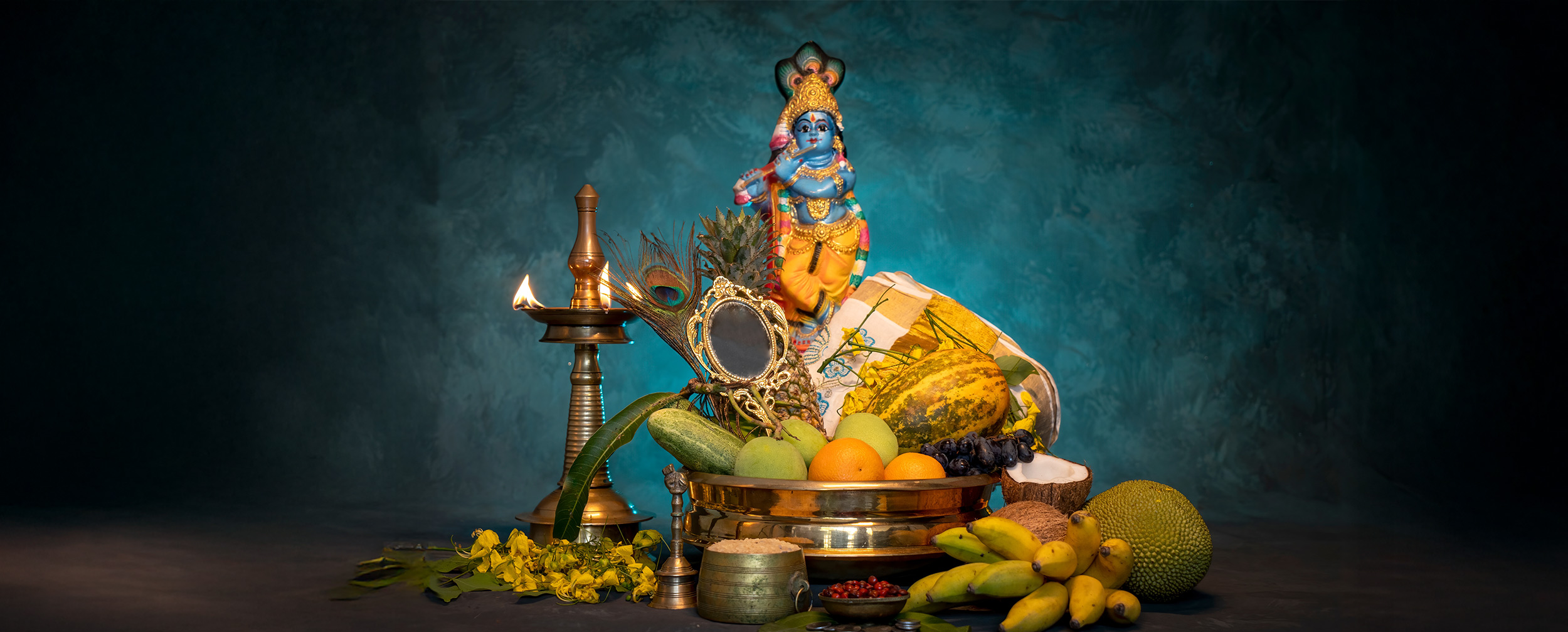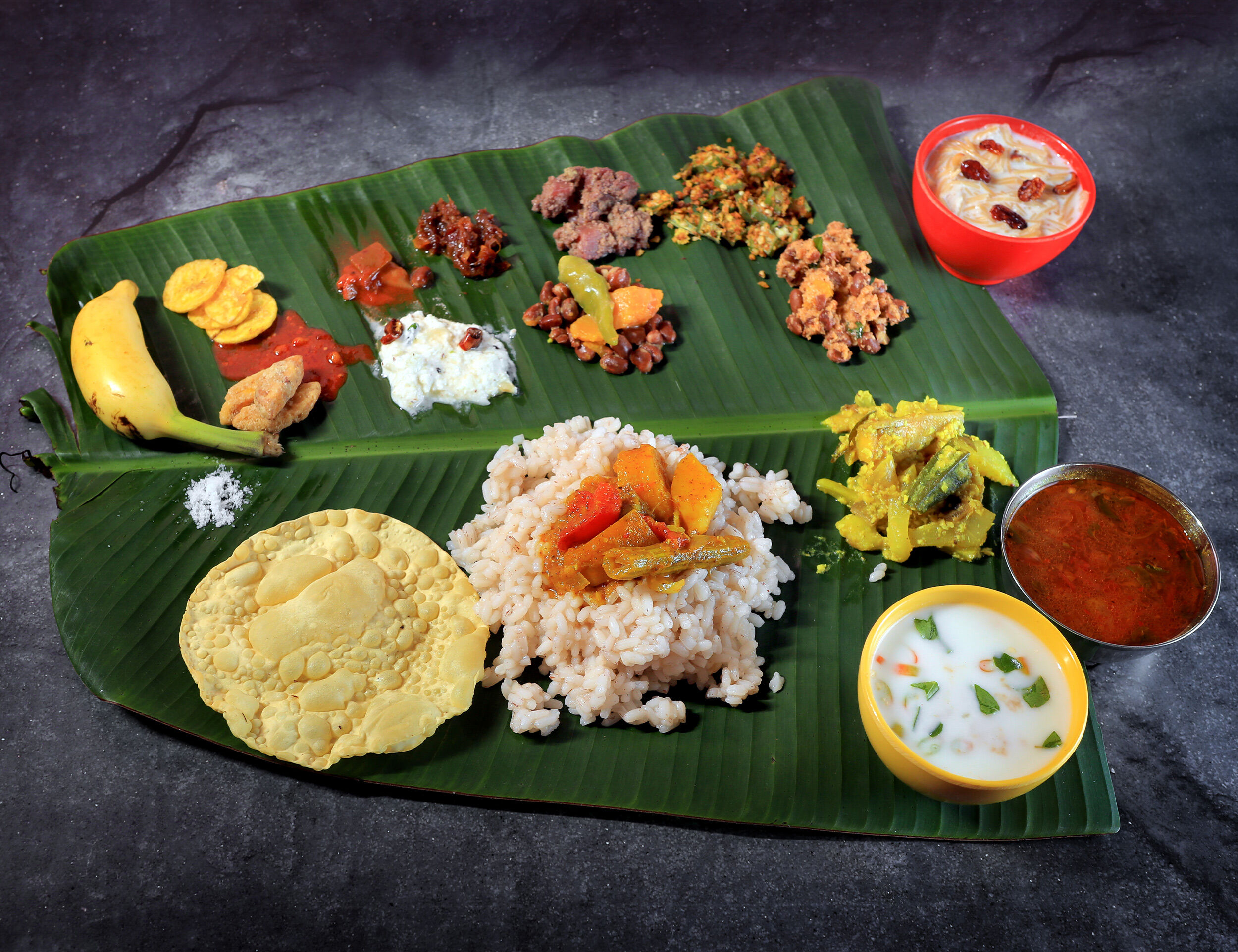STORIES BY DIWAS

Lifestyle
Tracing the Roots: The Captivating Story Behind Kerala's Vishu Festival
Date 10 April 2025 Reading time: 7-10 mins
Close your eyes and picture this: A crisp April morning, the air thick with anticipation. Intricate floral arrangements, a visual feast of colours and textures. The aroma of festive delicacies wafting through homes. Vishu, Kerala's most beloved New Year festival, is a time when the entire state comes alive with joy and festivity. But have you ever wondered about Vishu history, how this vibrant celebration came to be, and when is Vishu celebrated? Let's embark on a journey through the ages, unravelling the captivating story behind Vishu celebration history and its deep-rooted significance in Kerala's cultural tapestry.
The Origin of Vishu
The history of Vishu festival in Kerala can be traced back to the 9th century AD, during the reign of the Chera dynasty ruler, Sthanu Ravi. It was during this period that the Kolla Varsham calendar was adopted, marking a significant shift from the older 13-month calendar system. The word "Vishu" itself is derived from the Sanskrit term 'Viṣuvam,' which translates to 'equal,' symbolising the balance between day and night that occurs during the spring equinox.
Vishu history is also deeply intertwined with Hindu mythology, particularly the worship of Lord Vishnu and his avatar, Lord Krishna. Several legends in Vishu history are associated with the festival, including the tale of Lord Krishna's triumph over the demon Narakasura and the return of Surya Dev, the Sun God, after being temporarily obscured by the demon king Ravana.
The Evolution of Vishu Over the Years
As centuries passed, Vishu history continued to evolve, absorbing influences from various communities and regions. While the core rituals and traditions remained intact, the Vishu festival history saw the integration of local customs, especially in areas bordering Kerala, Karnataka, and Mahe. The celebration history of Vishu festival in Kerala also coincided with Puthandu, the Tamil New Year, leading to a beautiful blend of traditions.
Over time, Vishu became not just a religious festival but also a cultural extravaganza. Elaborate feasts, colourful processions, and vibrant dance performances became an integral part of the history of Vishu festival in Kerala. The festival also gained prominence as a time for family reunions, with people travelling from far and wide to be with their loved ones during this auspicious occasion.
Vishu as Kerala's New Year Festival
Vishu holds a special place in the hearts of Keralites as it marks the beginning of the Malayalam New Year. So when is Vishu celebrated? It is celebrated on the first day of the Malayalam month of Medam, which usually falls on April 14 or 15 in the Gregorian calendar. And when is Vishu this year? This year, it will be observed on Thursday, April 14.
Vishu celebration history is filled with a myriad of rituals and customs that have been passed down through generations. The most significant among the Vishu festival history is the preparation of the Vishukkani, an elaborate arrangement of auspicious items that is the first sight people see on Vishu morning. The Vishukkani typically includes a statue of Lord Krishna, fresh flowers, fruits, vegetables, gold coins, and a mirror, all carefully placed in a bell-metal vessel called uruli.
Other notable traditions in Vishu history include the giving of Vishu Kaineettam, where elders gift money to younger family members as a token of blessings, and the preparation of the Vishu Sadya, a sumptuous feast featuring an array of traditional dishes.
The Significance of Vishu in Kerala's Culture
The significance of Vishu extends far beyond its religious and mythological roots. The festival is a celebration of new beginnings, a time to let go of the past and embrace the future with renewed hope and vigour. Vishu festival history is a reminder to maintain a balance in life, just as the equinox signifies a balance between light and darkness.
Vishu history also serves as a powerful symbol of Kerala's rich cultural heritage. The festival brings people together, fostering a sense of community and strengthening the bonds of kinship. It is a time when the entire state is united in the spirit of festivity, transcending barriers of caste, creed, and social status, marking the significance of Vishu.
The Traditional Practices and Rituals of Vishu
Vishu is marked by a plethora of traditional practices and rituals that add to the Vishu festival history's charm and allure. One of the most delightful customs is the preparation of the Vishu Katta, a special blend of rice, coconut, and jaggery that is distributed among neighbours and friends as a gesture of goodwill.
Another integral part of the Vishu celebration history is the bursting of firecrackers, which is believed to ward off evil spirits and usher in good luck. The skies come alive with vibrant colours and the air reverberates with the sounds of joyous revelry.
Vishu is also a time when people adorn their finest ceremonial attire. Women draped in elegant kasavu sarees and men in crisp mundus and kurtas have created a visual spectacle over Vishu celebration history that is a feast for the eyes. Speaking of attire, Diwas offers a stunning collection of festive wear for men, including printed kurtas, embroidered kurtas, and textured kurtas that are perfect for the Vishu celebrations.
The Impact of Vishu on Kerala's Society
Vishu history's influence on Kerala's society is profound and far-reaching. The festival serves as a reminder of the state's rich cultural legacy and the importance of preserving these traditions for future generations. It also plays a crucial role in strengthening familial bonds and fostering a sense of unity among communities.
Moreover, Vishu celebration history has had a significant economic impact on the state. The festival season witnesses a surge in consumer spending, with people investing in new clothes, jewellery, and household items. The demand for handicrafts and festival delicacies also goes up, providing a boost to local artisans and small businesses.
The festival also has a positive impact on tourism, with many people choosing to visit Kerala during this time to experience the vibrant celebrations firsthand. The state's tourism industry benefits greatly from the influx of visitors, contributing to the overall economic growth and development.
Exploring the History of Vishu
Vishu is not just a festival; it is a testament to Kerala's vibrant cultural tapestry and the enduring spirit of its people. From Vishu festival history to its modern-day celebrations, Vishu has evolved and adapted, while staying true to its core essence of hope, renewal, and unity, marking the significance of Vishu. As we delve into the Vishu history, when is Vishu celebrated, and trace its journey through the ages, we gain a deeper appreciation for the rich traditions that define Kerala's identity.
So, this Vishu, depending on when is Vishu this year, as you deck up in your finest attire and gather around the Vishukkani with your loved ones, take a moment to reflect on the timeless significance of this beautiful festival. And if you're looking to elevate your festive look, be sure to check out Diwas' exquisite collection of festive wear, featuring a range of stylish kurtas that perfectly capture the essence of Vishu festival history.



